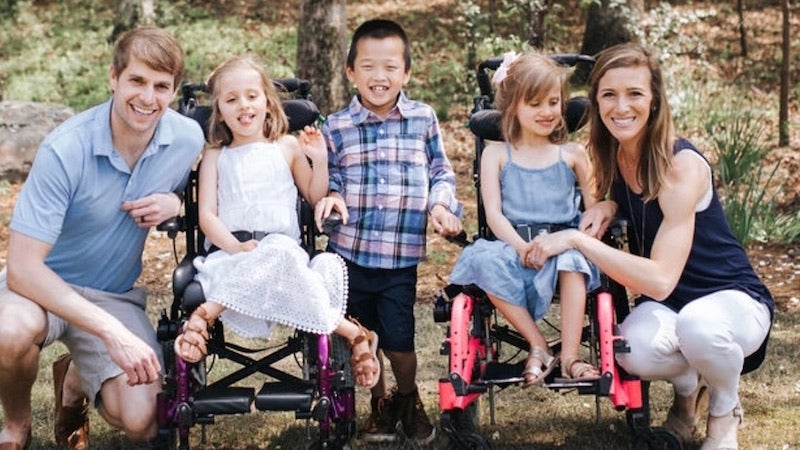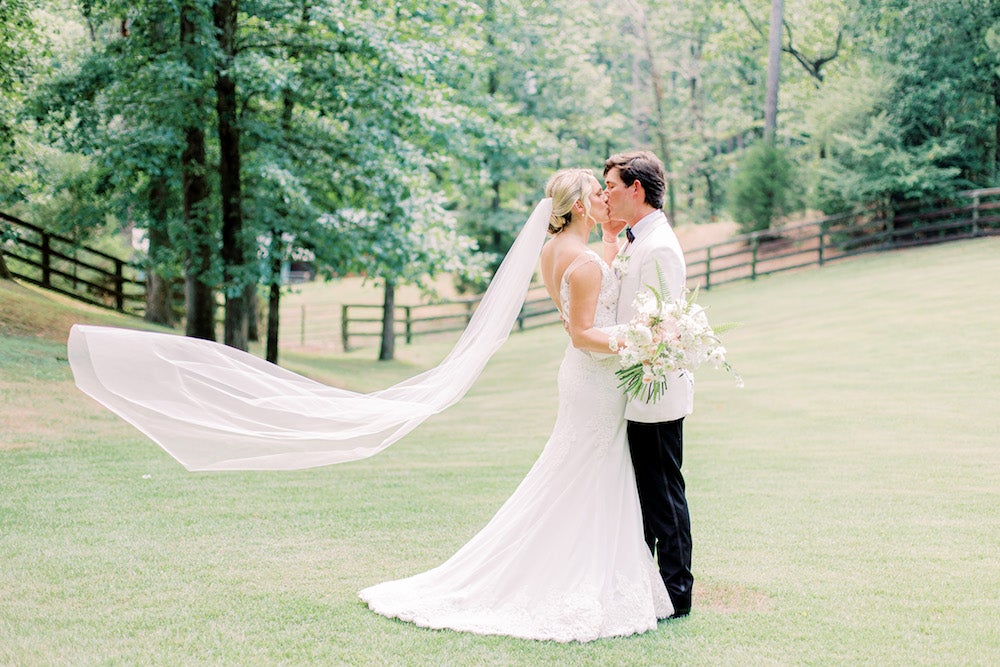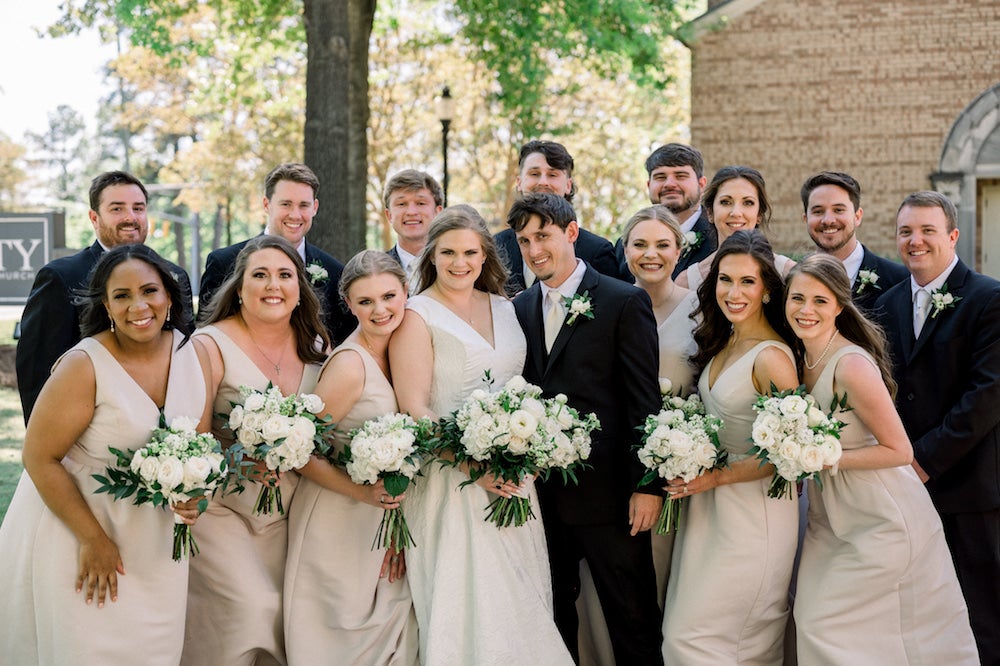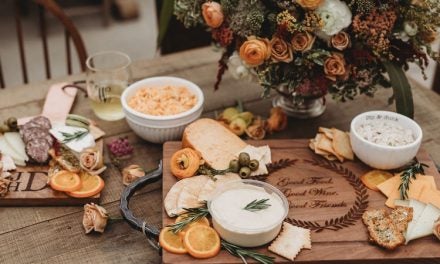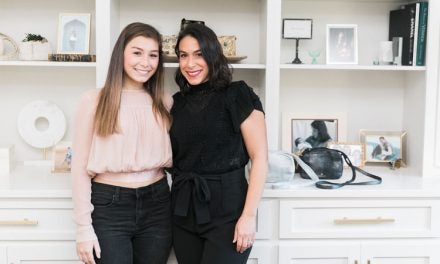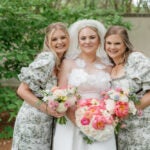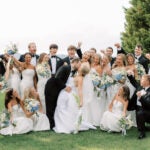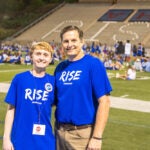By Madoline Markham
Photos Contributed
Even in the summer, two Christmas trees sit in the Cheek house in Liberty Park. One is decorated with ornaments friends of the family bought for them in honor of Morgan and Hugh’s daughter Bailey Grace the first Christmas after she passed away in July 2019 at age 6. The second instead holds notes that the family’s friends wrote at Bailey Grace’s twin sister Ally’s visitation in December 2020.
The trees are one of many ever-present reminders of the rich lives their daughters lived, but there’s also something extra special about lighting the trees each night.
“The light reminds me that there is something else going on even when it feels really dark,” Morgan says. “The light in the dark places is still present despite the dark that you experience. The light is still there when it feels like the dark is brighter, but it’s okay to recognize the dark is there too.”
The Joy of Life
Morgan lights up talking about each of her daughters’ distinct personalities. Bailey Grace was an old soul who always had this look on her face that said, “It’s all going to be okay, guys.”
Because of her rare genetic disease, she couldn’t hug, but she loved to grab your hand and pull it close to her face to give you a “hand hug.” Although she wasn’t verbal, she loved to sing in her own way, making deep babbling voices when worship music was on. She had a big, bright smile, and she hated wearing bows.
Ally, on the other hand, loved wearing bows. She was sassy and observant, never wanting to miss out on anything going on in the room. She also loved Disney and water and laughed all the time. While she had the same genetic disease as her sister, she could hug, and she would give you this serious look before she pulled you in for one.
Hugh and Morgan often told people before they met their daughters that they would get addicted to being with them. “There was something about them that was other worldly that everyone wanted to be around,” Morgan says.
And that was certainly true at Vestavia Hills Elementary Liberty Park. The Cheeks moved to Liberty Park five years ago specifically because they had fallen in love with the school’s special education program. “The teachers saw the value of the kids in that room and treated them with the value they have,” Morgan says. “Once you have had the privilege of knowing someone who is differently abled, you stop pitying them and start seeing them as people you can learn from and start to see it as a privilege to be around them. In that entire school environment that’s what they did.”
Ally and Bailey Grace both had strong hearts, but their disease progressively affected their brain and digestive system in ways that would ultimately take their lives. From age 2 on they had feeding tubes, and they both used wheelchairs. But still, they were very engaged and aware. They waved and clapped and paid attention to what was going on around them. As Morgan describes it, some aspects of her daughters’ development were infant-like but others were not at all, and she counts the ways they communicated and got feedback from each of them as one of their biggest gifts.
 The Unexpected Miracle
The Unexpected Miracle
Looking back on the past eight years, Morgan can see element after element of foreshadowing in early parts of her family’s story. She and Hugh met as college juniors at the University of Georgia at a Special Olympics meeting of all things. Morgan went on to become a social worker, and Hugh went to medical school to become a pediatrician. After they moved to Birmingham for his residency, they found out that—surprise—they were pregnant, and that—surprise—they were having twins. “Subconsciously you think that will be the weirdest thing that happens, to have twins his intern year,” Morgan recounts. “We had absolutely no idea what we were getting into.”
During the pregnancy, Hugh memorized Psalm 139, a passage that talks about life being formed in the womb—an act that Morgan now sees as foreshadowing. But still, her pregnancy was healthy, and she gave birth to Ally and Bailey Grace a day before they would have been full term. The girls came home, and there was no reason to think there was anything outside the ordinary about them.
At three months, though, Hugh and Morgan started to notice the twins didn’t have the head control they should have, and the Cheeks started early intervention. Later though both Bailey Grace and Ally started having feeding difficulties and saw a neurologist, and by nine months when they weren’t sitting up, the neurologist was worried and started conducting test after test.
It wouldn’t be until the girls were 2 years old that the Cheeks got a diagnosis from the National Institutes of Health. Their latest genetic test showed that they had the same genetic mutation as some rats in Sweden. It wasn’t known as a disease component at the time, but they soon found it was. The diagnosis was HECW2, and there were five other known cases in the world. Morgan often jokes about the name, “What the heck does this mean?” because so little is known about it.
“I got this diagnosis, which I really wanted, but it really meant nothing because there were only seven of us and we were writing the script of what this thing was going to be,” Morgan recounts.
Somehow around that time, though, she knew that Ally and Bailey Grace would die young. There weren’t any signs of it at the time, and she has no real explanation. But she just knew. And shortly thereafter the girls started having seizures that would recur the rest of their lives.
Through it all, the Cheeks prayed for healing for their daughters, but time and time again they didn’t see any. Instead their story turned into more and more of a nightmare as they faced surreal moment after surreal moment. But Morgan saw a miracle she didn’t expect instead at the same time.
“The miracle was happening inside of me, which was I was accepting what God had placed in front of us as his best plan,” she says. “I know that’s a miracle because my fists were so clenched in all the scenarios, and the next thing I knew they would be open and I would be accepting of it and feel at peace with it. It didn’t make sense.”
 Seeds & Leaven
Seeds & Leaven
Through this whole journey, Morgan wrote. She started a blog right before the girls were born, and quickly found that for her writing was like breathing. It just came out of her. Today her writing all happens on @seedsandleaven on Instagram, and she’s connected with many other people who are grieving and have lost children as she’s shared her experiences and processed them in words online. “The fact that I get to let other people in and encourage other people in the hardest spaces in their life is such a sacred thing,” Morgan recounts.
When the girls were a year and half, Morgan went to a hotel and wrote her first book, On Milk and Honey, in one night—a publication that she now sees was written as much for her as anyone else because it documented her journey. Later she wrote Are We There Yet?, and her third book, a grief devotional called Even in Darkness, is coming out this fall.
“This (book) is for the person who is in a dark place no matter what you believe,” Morgan says. “My hope and prayer is that people see not people’s response to grief but God’s response to grief and that they can find an intimacy of God in their hard spaces that resonates with them.”
And what is God’s response to grief? Here’s how she honestly articulated it: “I am an angry griever. I am a griever who vacillates between exercise and an extra class of wine and extra chocolate. I am all over the board. And I have found God is consistent in my grief, and he is right here with me in my grief. He is not tired of my grief. He is not telling me to put on a cheerful happy face. I think he’s weeping right here with me. There’s no greater comfort to me than that.”
Also on this grief journey, Hugh and Morgan fully recognize that statistically most couples with a child with special needs get divorced, and even more couples who lose a child do. For them, grief in this time and in their marriage is no small thing.
“Hugh and I just try to prioritize marriage, but it’s been extremely messy in this season because it’s almost like being an empty nester,” Morgan says. “So much of what connected us the past eight years was the girls. We were not perfect parents, but the care of our girls was a joy to do together. We rarely argued when the girls were alive. Now they are gone, and we are relearning our relationship. We are not the same people we were before the girls, and neither of us has the capacity to help one another in each other’s grief because we are grieving ourselves. It’s taken a lot of patience and grace, and remembering ultimately that we are committed to each other and love each other. That’s where your vows get meat on them.”
 Butterflies & Dragonflies
Butterflies & Dragonflies
As the Cheeks continue to journey through grief, they see markers of their daughters’ lives in many ways day in and day out. On one of the last days before Bailey Grace died, Morgan realized she wanted to have something that reminded her of her daughter and landed on butterflies and hummingbirds. “I have never seen that many butterflies in my life as I did that summer after she died,” she says. “I would go for a walk and see 40.”
For Ally she decided it would be sunsets in hues of her favorite color, pink—which she says also remind her of God’s consistency—and dragonflies. Ally’s classmates in Ms. Dixon’s Dragonflies at school had drawn her pictures of them when she’d gone on hospice, and like after Bailey Grace died, Morgan started seeing them everywhere following her death.
Morgan also has a tattoo of Psalm 139 with the letters A and B in the design on her foot she got when the girls were alive. After Bailey Grace’s passing, she got another tattoo of her nickname “BG” next to her C-section scar, and added another for Ally next to it after losing her.
Hugh, on the other hand, has a tattoo of a ram’s horn on his back. It signifies the story of Abraham and Isaac in the Bible where God asked Abraham to give up Isaac and then a ram appeared as a sacrifice instead. For him the ram in the story signifies Jesus, and the story reminds him of Bailey Grace. He’s still thinking on what he will get in honor of Ally.
Whether they are looking at Christmas tree lights after dark or the marks on their bodies that remind them of the daughters they have lost, Morgan and Hugh’s years with Ally and Bailey Grace are ever on their minds.
“The girls made us see life in the most clear way,” Morgan says. “We would spend our days laying on the floor watching Disney movies, looking up at the stars at night, going on walks—doing what a lot of people consider nothing. But it felt so rich, and we had no reason to do anything else. It was the most simple, good life.”
Follow Morgan’s writing at @seedsandleaven on Instagram and seedsandleaven.com.
What to Know About a Friend Who is Grieving
In Morgan Cheek’s Words
If you are close with people who go through tragedy like the death of a child or a spouse, know that the grief doesn’t ever go away. Put on your seatbelt. When you lose someone, you are forever changed. CS Lewis talks about how it’s like an amputation. It’s not like your leg comes back. Your leg is always gone. You learn to get around without a leg, but it never leaves you.
For me after losing two children, I am never going to be the same. I hate that. I am never going to be as good of a friend. I am never going to be able to relate to people as well and sympathize with people as much as they like when their tire goes flat.
Sometimes I don’t even know what I need, but I think we can always offer one another consistent grace and consistent presence. The friends I will continue to have are the friends who don’t have expectations on me and that continue to reach out and be selfless even when I don’t respond sometimes.
In grief it’s like you are depressed and anxious and in fog all the time all at once. Often you don’t know how to get out bed much less how to respond to a text. Sometimes going to dinner sounds fun, and then something shifts and it doesn’t sound fun anymore. So you can be a pretty bad friend to people when you are grieving. It’s not an excuse, but people have to learn to give a huge amount of grace and not assume that as time passes that grief gets better. It’s just different.
The first few weeks you literally feel like you can’t breathe. One of my mentors who had had a child die called me and said, “You will be able to take a deep breath again.”
But you are never going to be the same again, and you have to learn to be friends with someone who has an amputation to their heart in a sense.
 An Adoption Story
An Adoption Story
Amidst the story of Ally and Bailey Grace unfolding came another Cheek sibling as well. Ally and Bailey Grace’s disease is not hereditary, so Morgan and Hugh were just as unlikely to have another biological child with it as any other person. Still, they’d always wanted to adopt. That was certainly not on Morgan’s radar when the girls were 2 years old and Hugh brought it up though.
At first she told him adopting was a crazy idea, but then she prayed about it and felt like God was telling her adoption was a part of the story. So they signed up for domestic adoption. Three years went by, and they still hadn’t been matched when an acquaintance showed Morgan a photo of boy in China who was 6.
“This little boy was in my daughter’s orphanage,” the acquaintance said. “Do you know anyone adopting from China?”
“The second I looked at the picture, I knew exactly what was happening,” Morgan recounts today, “and I said, ‘No I am not doing it. I am not going to China and adopting an older child.’ Because I was a social worker, I know the risks of adopting an older child, in our home in particular, but I knew that was the story from the moment I saw him.” Without any prompting, Hugh had the same thought when she showed him the photo, and eight months later they were on a plane heading to China.
James, now age 10, has cerebral palsy, but it only affects his limbs and he walks with a cane. He is in third grade this year, and although two and a half years ago he’d never been to school and never spoken English, his English is strong. “He’s such a cool kid,” Morgan says. “He’s a joyful person to be around.”
More than anything, too, Morgan notes that his story is still unfolding.

